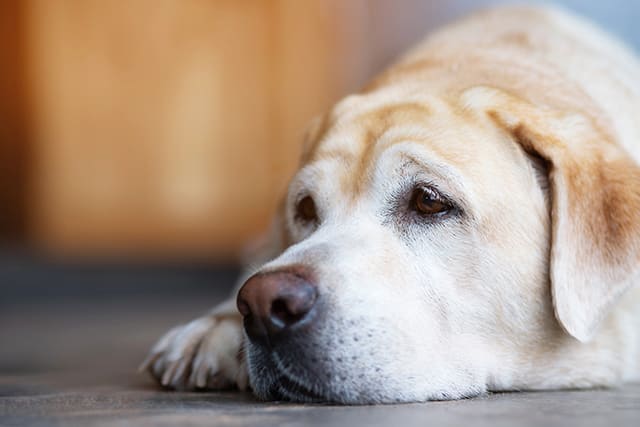Although it's not a condition that most pet parents think about, dogs like people can develop pneumonia. Pneumonia in dogs can be a serious health concern, however treatment is available and most dogs recover well. Here our Southeast Memphis vets share some of the symptoms of pneumonia in dogs, and how this condition is treated.
What is pneumonia in dogs?
As with people, pneumonia in dogs affects the respiratory system interfering with your pup's ability to breathe normally. While some forms of pneumonia are more difficult to clear-up than others, with treatment, most dogs recover well from pneumonia. That said, if the condition is left untreated more serious issues can develop.
What is infectious pneumonia?
The most common type of pneumonia in dogs is infectious pneumonia (also called bacterial pneumonia). Infectious pneumonia is caused by a viral or bacterial infection in the dog's airways. Bordetella bronchiseptica is one of the bacteria most commonly linked to infectious pneumonia in dogs, and can easily be transmitted between dogs that are very young, senior, or that have a compromised immune system.
What are the symptoms of bacterial infectious pneumonia in dogs?
Dogs suffering from infectious pneumonia or bacterial pneumonia may display one or more of the following symptoms:
- Coughing
- High fever
- Runny nose
- Wheezing
- Breathing difficulties
- Lethargy
- Difficulty exercising
- Nasal whistling
- Irregular breathing
- Dehydration
- Weight loss
- Loss of appetite
If your dog has been diagnosed with bacterial pneumonia it's a good idea to keep your unwell dog away from other pets in the household, and to wash bedding, bowls, collars and leashes frequently to help avoid spreading the disease. Also be sure to wash your hands immediately after petting or handling a dog with infectious pneumonia.
What is aspiration pneumonia in dogs?
If your dog accidentally inhales vomit or medication, has an abnormality of the pharynx, or a neuromuscular disorder which affects respiratory function, aspiration pneumonia could develop. In some cases an enlargement of the lower esophagus due to frequent regurgitation caused by acid reflux can lead to aspiration pneumonia, as can an incorrectly placed feeding tube.
What are the signs of aspiration pneumonia?
Symptoms of aspiration pneumonia can be very similar to those of infectious bacterial pneumonia and may include one or more of the following:
- High fever
- Coughing
- Breathing difficulties
- Runny nose
- Difficulty exercising
- Lethargy
- Wheezing
- Nasal whistling
- Dehydration
- Irregular breathing
- Loss of appetite
- Weight loss
However, aspiration pneumonia may also cause other symptoms such as:
- Difficulty swallowing
- Bluish skin
- Altered mood
- Frequent regurgitation
If your dog is displaying any of the signs of aspiration pneumonia contact your vet to book an immediate appointment for your pup. Early diagnosis and treatment could help to prevent more severe, harder to treat, symptoms from developing.
Is treatment available for pneumonia in dogs?
If your dog has been diagnosed with either infectious bacterial or aspiration pneumonia your veterinarian will likely prescribe medications to help control symptoms such as non-steroidal anti-inflammatory medications for fever and pain, and bronchodilators and expectorants for coughing and breathing issues. Your dog may need to be hospitalized and provided with fluid therapy, supplemental oxygen, or intravenous antibiotics if they are suffering from a particularly severe case of pneumonia.
How can I help my dog to recover from pneumonia?
Your vet will provide you with specific instruction on caring for your dog during their recovery however typical instructions for care include:
- Restricting your dog's activities while they recover.
- Keeping other pets and small children away from your dog in order in order to allow them to get plenty of rest.
- Supplying plenty of fresh water to help keep them hydrated.
- Treating your dog with a steam treatment by running a hot shower while you sit with your dog in the bathroom or shower room.
If your dog is experiencing difficulties breathing contact our Southeast Memphis vets at Southwind Animal Hospital to book an appointment. Our compassionate vets are here to help your pet feel better.

Looking for a vet in Southeast Memphis?
We're always accepting new patients, so contact our veterinary hospital today to book your pet's first appointment.
Related Articles View All
How can a dog get rabies? What are the signs?
Rabies is a fatal, highly contagious, virus that can affect dogs, cats, livestock and humans! What are the signs your dog has rabies? What should you do? Read on to find out.
Signs that Your Dog May Have an Ear Infection
Dog ear infections need treatment quickly to prevent the condition from becoming more severe, or causing recurring infections in the future. So, how can you tell if your dog has an ear infection? Read on to find out.
How often should I take my dog to the vet?
Taking your dog to the vet regularly is a proactive way to help your pet live a long and healthy life, but how often should you take your dog to the vet? And, how can you save money on these routine appointments? Read on to find out.
Puppy Shots Schedule - When To Get Your Puppy Vaccinated
Vaccinations play an essential role in protecting your puppy's health in their first year of life. Here, you will find vital information about puppy vaccines and a schedule to help you plan for your puppy's shots.
Should I microchip my dog?
If your dog is lost or stolen, a microchip sitting under their skin can increase their chances of being returned to you. Not sure if you should get your four-legged friend microchipped? Below, we look at some of the reasons why many vets recommend microchipping for dogs.
